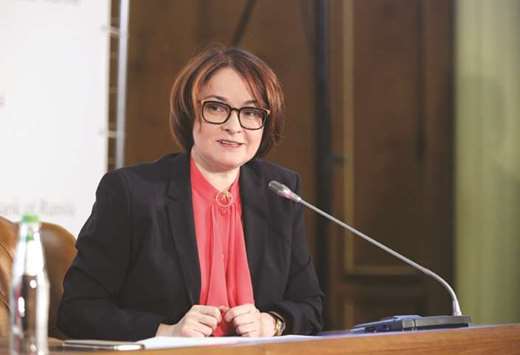Central bank cuts interest rate by 50 bps, sharper than expected; says global oil output cut deal eased inflation risks; central bank to keep on cutting rate in 25 or 50 bps steps; cut could help consumers feel good before election
The Russian central bank delivered a sharper-than-expected rate cut yesterday, a move that could help give consumers a feel-good factor months before the March presidential election which incumbent Vladimir Putin is expected to win.
The bank, which said further, cautious reductions were possible in the first half of next year, lowered its key rate by 50 basis points to 7.75%, a level last seen in mid-2014, from 8.25%.
The sixth cut so far this year was a surprise for the market.
All 22 analysts polled by Reuters expected the central bank to cut the rate by just 25 basis points to 8%.
“The 50 basis points step was picked because we have changed our view on 2018 prospects,” Elvira Nabiullina, the bank’s governor, said yesterday, presenting the rate decision.
Lower rates are beneficial for Russia as they spur economic growth by boosting consumer demand through cheaper lending.
Putin, who will run in the 2018 election for what would be his fourth presidential term, said earlier this week he fully supported the central bank’s policy.
Lower rates could please voters ahead of the election by making it cheaper for Russians to get consumer credit and take out mortgages.
Though polls show Putin is on track to easily win, there are signs of apathy among voters and the Kremlin is keen to ensure a high turnout.
The Opec and non-Opec agreement to extend an oil production cap has helped lower inflationary risks, Nabiullina said, explaining the rationale for the sharper rate cut. Prices for oil, Russia’s key exports, are now seen averaging $55 per barrel next year, up from around $40 expected before, Nabiullina said.
“It is all about the Opec+ deal and lower inflation risks in 2018,” ING said in a note on the central bank rate decision referring to the pact including non-Opec countries.
Now the central bank expects 2017 inflation to be at a record low of 2.5%, before returning back to its 4.0% target by the end of 2018, Nabiullina said.
Inflation has slowed faster than expected this year largely thanks to booming agriculture production, a stronger rouble and the central bank’s tight monetary policy. “The Bank of Russia will continue its gradual transition from moderately tight to neutral monetary policy and holds open the prospect of some key rate reduction in the first half of 2018,” the central bank said in a statement.
“However, the risks of upward deviation of inflation from the forecast in the medium term still prevail,” it said.
The central bank also said it had also confirmed its economic growth forecasts for this year at 1.7-2.2% and upped 2018 growth forecast to 1.5-2.0% from 1.0-1.5% expected earlier.
The central bank will continue trimming the rate in 25 or 50 basis point steps or may opt to hold rates at some of the eight monetary policy meetings planned for next year, Nabiullina said.
Nabiullina also confirmed the central bank’s plan to bring its key rate down to 6-7% over the next two years as a sharp slowdown in inflation leaves room for cuts.
The scale of yesterday’s cut and Nabiullina’s tone “reinforce our view that interest rates will ultimately be lowered by more than is currently priced into the markets,” Capital Economics research firm said.
“We still think there is a downside potential of 75-100 basis points for the key rate in 2018 sticking to the 6% call in 2019,” ING said. The next rate-setting meeting is scheduled for February 9.

Nabiullina: Changing the view on 2018 prospects.
